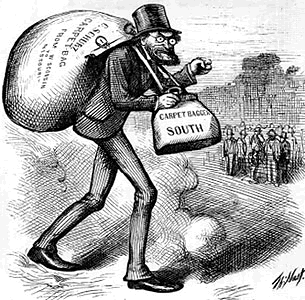
Ilankai Tamil Sangam
Association of Tamils of Sri Lanka in the USA
Published by Sangam.org
In sum, Carpetbaggers were seen as insidious northern newcomer outsiders with questionable objectives meddling in local politics, buying up plantations at fire sale prices, taking advantage of poor southerners and pushing their alien northern ways on southern politics. |

Scalawags and Carpetbaggers were derogatory terms used in the aftermath of the American Civil War that ended in 1865.
Scalawags - originally a term describing worthless livestock - referred to a group of white Republican Southerners who sympathized with the federal Reconstruction effort. Some of the scalawags were entirely above board, having opposed the Confederacy in earlier times and later wanted a new South to emerge from the rubble. Others cooperated with or served in the Republican governments in order to avail themselves of money-making opportunities.
Carpetbaggers, also a term of derision, were white business people from the North who moved to the South during Reconstruction, 1867-1877. Many Carpetbaggers were former abolitionists who wished to continue the struggle for equality, while others Carpetbaggers saw the reconstruction of the South as a political or economic opportunity. The name referred to the cloth bags many of them used for transporting their possessions, but today is applied to any recently arrived opportunist.
In sum, Carpetbaggers were seen as insidious northern newcomer outsiders with questionable objectives meddling in local politics, buying up plantations at fire sale prices, taking advantage of poor southerners and pushing their alien northern ways on southern politics. The term carpetbagger is not to be confused with the term 'copperhead,' which is a term given to person from the North who sympathizes with the Southern right to Secession, self-determination and independence.
The term carpetbaggers was also used to describe the white northern Republican politicians who came South, arriving with their travel carpetbags. Southerners considered them ready to loot and plunder the defeated South.
According to myth, unscrupulous carpetbaggers from the North and unprincipled scalawags from the South manipulated the freedmen to gain control of the state governments. Backed by the presence of federal troops, they embarked on an orgy of corruption, humiliating and impoverishing the helpless South and unsettling relations between blacks and whites. At last, the nation grew weary of the corruption and the cost of maintaining troops in the South. The army was withdrawn and the responsible white citizenry regained control of their governments.
According to a stereotype popularized after Reconstruction, the carpetbaggers were dishonest fortune seekers whose possession could be put in a satchel. "They are fellows who crawled down South on the track of our armies...stealing and plundering," said editor Horace Greeley. Contrary to legend, most carpetbaggers were not impoverished opportunists seeking easy money in the South. Rather they were former soldiers who migrated to the South to seek a livelihood. They generated hostility because they supported the Republican Party and defended the civil and political rights of freedmen.
© 1996-2024 Ilankai Tamil Sangam, USA, Inc.